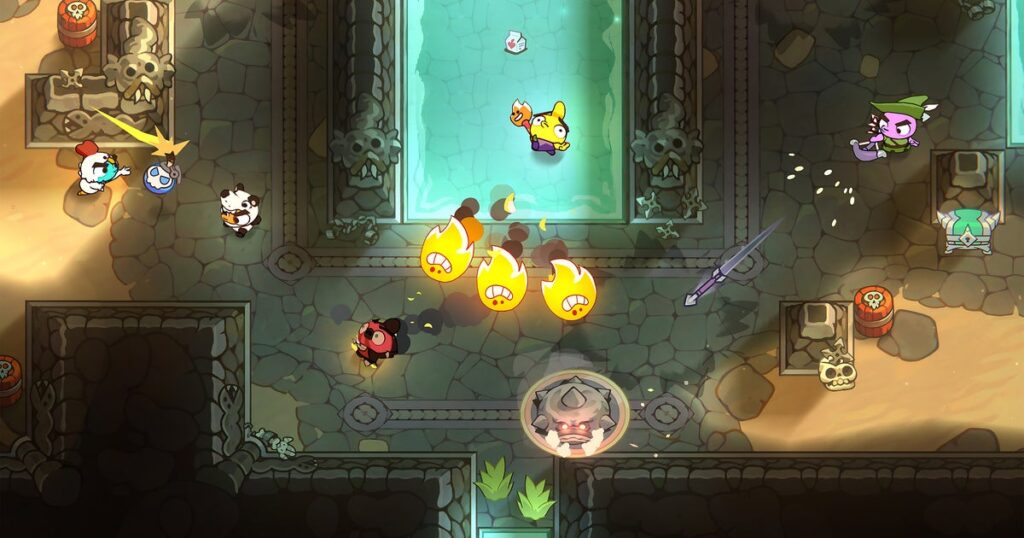Awesomenauts devs reclaim their unfinished game as new studio Rangatang

Ronimo Games, the Dutch developer behind indie hit Awesomenauts, filed for bankruptcy in August last year. Today, four former members of the team – including the CEO – return with a new studio, Rangatang.
Not only that, the quartet is already hard at work on Nubs, the game Ronimo never got the chance to finish.
Co-founder Olivier Thijssen tells GamesIndustry.biz that Ronimo’s bankruptcy followed the unexpected cancellation of a publishing deal. The Awesomenauts studio had “quite a colourful history” of narrow escapes, but this was one setback the team couldn’t survive.
“There were multiple moments where we went through a keyhole or just about survived,” he explains. “Just before the release of Awesomenauts was one such moment. The publisher actually went bankrupt two weeks before [the game] launched.
“But [Ronimo’s bankruptcy] was a moment where the keyhole was just a little bit too small. We had a publishing deal with a renowned publisher whose name I shall not mention because the bankruptcy is still in progress. But the game was shaping up very well, we were happy, the publisher was very happy – and then lightning struck. They informed us that they were shutting down a European branch of their organisation. We had to look for money elsewhere to fund the rest of the game.”
The deal was scrapped shortly before GDC 2023, when Ronimo’s indie brawler Nubs was mid-development and only half funded. Thijssen and his team managed to secure around 40 meetings at the San Francisco conference and came close to signing a new publishing deal, with one even involving the acquisition of the studio, but each one fell through at the last moment.

Wider moves in the industry didn’t help matters. Thijssen points to the news from Embracer that followed shortly after, in which the group lost a crucial deal of its own and began a restructuring process that led to multiple studio closures, sales, and over 1,000 layoffs. He says he saw it as an example of the “doom and gloom on the horizon.”
“At the higher levels on the investors’ side, there was a lot of angst at that moment and a lot of investors were looking forward, thinking ‘Wait a minute, if these other investors are going to be falling over, there’s going to be a lot of cheap stuff that we can buy in half a year’,” he says. “This made the entire market very reluctant to fund anything. We’re still in that situation now, but back then it was quite horrible.
“So even though we had a very nice game in development, we had a super good pitch, an extremely talented team, and a lot of awesome stuff, we weren’t able to make it happen before our time was up. At some point, the money just ran out and you have to pull the trigger.”
Ronimo Games had around 25 employees by the end, all of whom faced the unenviable search for new roles in a market that had already seen tens of thousands of professionals laid off in just two years. Two members of the team – lead programmer Maarten van den Heijkant and lead core tech programmer Machiel van Hooren – began discussing ideas for reviving the unfinished Nubs. They were keen to have Thijssen on board for, but the CEO was focused on closing the studio and all the processes involved in this.
In September 2023, a month after filing for bankruptcy, Thijssen and the two programmers made a bid for the Nubs IP from their own savings, keen to see if they could finish the project. The following month, their bid was successful and “the idea train began to roll.”
Unfortunately, this was not a case of simply picking up where they left off. Nubs was “a super complex half-finished game with a lot of wires sticking out everywhere” with up to 700 man hours poured into it. The new team was just three people – later four after hiring Ronimo artist Gijs Witkamp to maintain Nubs’ quirky visual style – who had to work out how to adapt the project.
“Even though we had a very nice game in development, we weren’t able to make it before our time was up. At some point, the money just ran out and you have to pull the trigger”
Olivier Thijssen, Rangatang
This primarily came down to cutting elements of the game that “we would never be able to complete with a team of less than 25 or 30 people,” Thijssen says. For example, the cartoony brawler was originally designed as a giant top-down world that players could explore, whereas the Rangatang version of Nubs is now split across smaller arenas with more focus on rounds-based competition.
“We’re only going to use the best aspects of the game and see how we can leverage that optimally,” Thijssen explains. “That was actually quite nice to do because you can quickly make very large decisions.”
However, Nubs’ fate this time is not solely reliant on the Rangatang quartet. The new studio has teamed up with another four-person studio, Belgium-based developer Glowfish Interactive, in a co-development deal to help bring the game to completion.
Co-founder and technical artist Emiel Da Paepe tells GamesIndustry.biz he first learned of Thijssen and his team during talks with a local venture capital firm about potential investments.
“I got a call saying, ‘Hey, these guys are looking for extra bandwidth, [could you] see if there’s any potential for collaboration?'” he says. “So we did that in February [2024], we went over to the Netherlands, played the game, had a chat, and we hit it off quite well. In a lot of aspects, we have a very similar vision when it comes to what makes a game cool. And then gradually that evolved into the collaboration that we have going on now.”
The crucial experience Glowfish brings to the table is its years of working with Unity, on which Nubs is now being built. Ronimo had previously always used proprietary technology for its games, so there were complementary skillsets that would allow the two studios to help each other out.
“We played it at their office and we were like, ‘OK, this is just good solid fun’,” De Paepe continues. “Based on learnings we had from our previous title Trifox – which was a single player game but had a similar approach of very modular gameplay – we saw the potential of injecting a lot of that into this multiplayer game. It’s about having a very simple core that is easy to scale and adding a lot of interesting elements to it, keeping it accessible but very interesting at the same time.”

Ronimo’s version of Nubs was also attempting to appeal to a much broader audience, while the new studio is being more targeted; rather than creating something lots of people might enjoy, Rangatang hopes to reach fewer players who become more dedicated fans, drawing on learnings from their previous hit.
Awesomenauts was a title De Paepe in particular For De Paepe, it was also a chance to work with some of the folks behind a game he admired greatly. He recalls playing it Awesomenauts frequently and praised its ability to distil what can be an intimidating genre, the MOBA, into something a wider range of people can play and enjoy. This is something he hopes to help Nubs do with that game’s chosen genre.
“You have more serious brawlers, but we want to take the competitive edge of that and bring it in a more accessible, condensed package so that the more competitive gamer can still enjoy it but at the same time it’s a nice entry for people that would be like, ‘Oh, that looks scary to me.’
“A lot of people look at League of Legends and are like, ‘What the hell is going on?’ Awesomenauts was easier, simpler to understand, but the competitive edge was still there. That’s what we want to do with Nubs as well. You can feel that competitiveness in it, it’s not just a party brawl or a game that you start up once or twice and then you forget about it. We want it to be part of what they do on a daily or weekly basis.”
Thijssen concludes: “Awesomenauts was a multiplayer game that was accessible and playable by a broad audience, but they could also take it very seriously. Part of my personal belief is that even casual gamers, when in a competitive setting, want to be taken seriously and the competition needs to be honest. You’re fighting for something and there are real stakes, even if the setting is a little bit more casual than other games.
“Right now, we’re more leaning into combat and chaos. It’s very in your face but players can deal with that. That’s what we noticed with Awesomenauts, so that’s one learning that we’re trying to apply here.”
Source link : Gamesindustry


